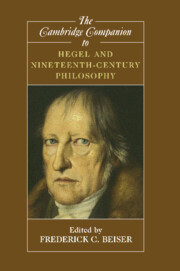Book contents
- Frontmatter
- Introduction: The Puzzling Hegel Renaissance
- 1 Hegel: A Life
- 2 Ancient Skepticism, Modern Naturalism, and Nihilism in Hegel’s Early Jena Writings
- 3 Hegel’s Phenomenology as a Systematic Fragment
- 4 The Independence and Dependence of Self-Consciousness: The Dialectic of Lord and Bondsman in Hegel's Phenomenology of Spirit
- 5 Hegel’s Logic
- 6 Hegel’s Idealism
- 7 Hegel and Hermeneutics
- 8 Hegel’s Social Philosophy
- 9 Hegel’s Philosophy of Religion
- 10 Hegel and Mysticism
- 11 Philosophizing about Nature: Hegel’s Philosophical Project
- 12 Hegel’s Criticism of Newton
- 13 The Logic of Life: Hegel’s Philosophical Defense of Teleological Explanation of Living Beings
- 14 Hegel and Aesthetics: The Practice and “Pastness” of Art
- 15 The Absence of Aesthetics in Hegel’s Aesthetics
- Bibliography
- Index
10 - Hegel and Mysticism
Published online by Cambridge University Press: 28 July 2009
- Frontmatter
- Introduction: The Puzzling Hegel Renaissance
- 1 Hegel: A Life
- 2 Ancient Skepticism, Modern Naturalism, and Nihilism in Hegel’s Early Jena Writings
- 3 Hegel’s Phenomenology as a Systematic Fragment
- 4 The Independence and Dependence of Self-Consciousness: The Dialectic of Lord and Bondsman in Hegel's Phenomenology of Spirit
- 5 Hegel’s Logic
- 6 Hegel’s Idealism
- 7 Hegel and Hermeneutics
- 8 Hegel’s Social Philosophy
- 9 Hegel’s Philosophy of Religion
- 10 Hegel and Mysticism
- 11 Philosophizing about Nature: Hegel’s Philosophical Project
- 12 Hegel’s Criticism of Newton
- 13 The Logic of Life: Hegel’s Philosophical Defense of Teleological Explanation of Living Beings
- 14 Hegel and Aesthetics: The Practice and “Pastness” of Art
- 15 The Absence of Aesthetics in Hegel’s Aesthetics
- Bibliography
- Index
Summary
INTRODUCTION
That there is something “mystical” about Hegel's philosophy is a familiar claim. In the years following Hegel's death it was a commonplace. In an 1840 essay on Meister Eckhart, the Danish philosopher Hans Martensen remarked that Hegel (as well as Schelling) had “demanded that philosophical thought rejuvenate itself in the immediate knowledge of God and divine things found in mysticism.” Friedrich Theodor Vischer remarked that the Hegelian philosophy had come forth “from the school of the old mystics, especially Jakob Boehme.” In his 1835 work Die christliche Gnosis, Ferdinand Christian Bauer claimed that Hegel was a modern Gnostic, and argued for his philosophical kinship with Boehme. Wilhelm Dilthey later noted the same affinity between Hegel and the mystics. More recently, authors as different as Bertrand Russell and J. N. Findlay have claimed a “mystical element” in Hegel's thought - Russell in order to disparage Hegel, Findlay in order to elevate him.
In this chapter, I shall survey the evidence for the influence of mysticism on Hegel's writings. I shall argue that the evidence is abundant and the influence decisive. However, even if it can be established that there was such an influence, and that it was of importance, this does not mean that the Hegelian philosophy can itself be accurately described as mystical. Therefore, this issue must be addressed as well, and I shall approach it, primarily in section three, through an examination of what Hegel himself had to say about the relationship of his philosophy to mysticism.
- Type
- Chapter
- Information
- Publisher: Cambridge University PressPrint publication year: 2008
- 2
- Cited by



